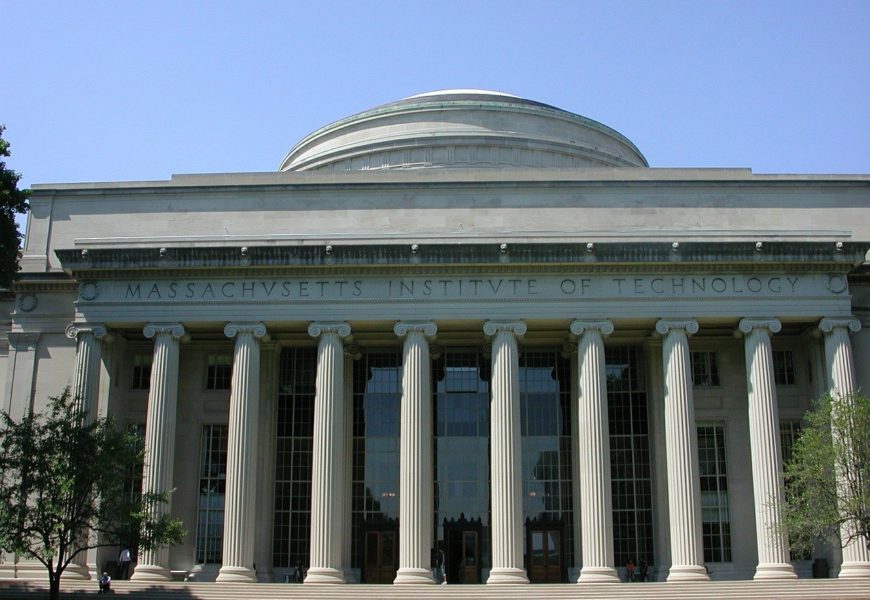Massachusetts Institute of Technology in Boston, where Díaz currently teaches creative writing. Image courtesy of Joakim Roubert from Pixabay.
For a literary celebrity, Junot Díaz arrived in a remarkably modest fashion. Twenty minutes late due to thick Connecticut traffic, he quietly entered the 1941 room through the main door and walked along the side of the crowd without announcement. Díaz stood silently next to Professor Sheetal Chhabria, wearing a gray hoodie and a t-shirt that read “the Latino race” in the design of The North Face’s iconic logo. Looking displeased and uncomfortable, he crossed his arms and appeared to shrink as Chhabria offered a long, laudatory introduction. Eventually, he interrupted her in good humor. As he spoke, he relaxed visibly and laughed while struggling to tie his sweatshirt around his waist.
Díaz explained that he had stopped Chhabria because life under a dictator had made him wary of drawn-out personal descriptions laden with flattery, but later admitted that “It takes a long time to discover the intensity with which we desire approval.” The dictator to whom Díaz alluded was former Dominican President Rafael Trujillo, also known as “El Jefe” and characterized by Díaz as “a portly, sadistic, pig-eyed mulato who bleached his skin, wore platform shoes, and had a fondness for Napoleon-era haberdashery” in his Pulitzer-winning novel, The Brief Wondrous Life of Oscar Wao.
Díaz was born in Santo Domingo, Dominican Republic but immigrated to Parlin, New Jersey as a child. He is now the fiction editor for Boston Review and a creative writing professor at MIT, where even as a widely read and respected author, he noted that he still experiences discrimination, largely from students who are “surprised when a poor person of color is smarter than them.”
“Suddenly,” Díaz said, “the Klan jumps out of their mouth.”
While Díaz clearly had a wealth of knowledge and anecdotes to share, he devoted most of his hour and a half to questions from students. He said that on the morning of Apr. 22, the day of his visit, a student emailed him six articles detailing the controversies that erupted on campus roughly a year ago, including the backlash against Professor Andrew Pessin and the racist graffiti in Cro.
Díaz acknowledged the institutional shame born out of these events and vowed that he would get students to talk, citing patience as his most powerful tool in uncovering information.
“You’d be amazed,” noted Díaz, “at the answers you can get if you don’t ask questions.”
As anticipated, he was right, and students soon brought up the tensions on campus.
Having earned his B.A. from Rutgers University in 1992, Díaz commented that he’d had a starkly different college experience than undergraduates today. He attributed this largely to the increased accountability of current college students, advocating that mistakes made in college, aside from the most unforgivable, should remain there.
Díaz explained that during his undergraduate time, students disputed openly, sometimes physically. While he did not advocate for violence, Díaz stated the position that students should be able to engage in unmediated arguments. When he got into conflicts, Díaz added, whatever the circumstances were, “there wouldn’t be fucking 12 deans and 80 parents there.”
Díaz spoke to the false comfort that intense mediation and supervision seeks to provide, noting, “You will never learn if you’re not uncomfortable.”
Referencing the power of his own discomfort, Díaz recalled a group of radical women he met during college who drastically altered his perspective, admitting, “I was in many ways saved by these women.” He also clarified: “I’m not a feminist because I believe male privilege prevents [men] from being real feminists” and instead called himself a “feminist ally.”
Constructed comfort, then, helps no one, and Díaz further explained: “These institutions need to give us real safety–which they don’t and they never have.”
He added that when he was in college, “it wasn’t a business,” and either way, “Universities are not human. They have no feelings. You can hit them hard.”
Díaz emphasized the importance of challenging any institution, whether concrete or abstract. He called white supremacy “a hegemonic system that has colonized and saturated our souls” and pointed out “toxic border logic” which relies on a belief “that these borders are sacred in ways that are untrue.”
These racist and xenophobic conceptions, Díaz pointed out, are entirely legal and engrained in our daily consciousness. “Every time I try to create something dystopian,” he noted, “our politicians outdo me.” He cited the importance of “small anarchies,” that serve as individual challenges to an all-encompassing system, by claiming that “the only way that we’re going to break up this bullshit is by breaking a little law every day.”
While some of Díaz’s rhetoric was intense, he did voice an ultimately positive outlook.
“If you think about what’s required [to enact change],” Díaz said, “it sounds like an insurmountable amount–’til we do it.” •










